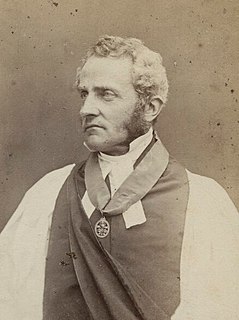A Quote by Frederic Farrar
We often do more good by our sympathy than by our labors. A man may lose position, influence, wealth, and even health, and yet live on in comfort, if with resignation; but there is one thing without which life becomes a burden--that is human sympathy.
Related Quotes
For even satire is a form of sympathy. It is the way our sympathy flows and recoils that really determines our lives. And here lies the vast importance of the novel, properly handled. It can inform and lead into new places our sympathy away in recoil from things gone dead. Therefore the novel, properly handled, can reveal the most secret places of life: for it is the passional secret places of life, above all, that the tide of sensitive awareness needs to ebb and flow, cleansing and freshening.
God grant that as our horizon of duty is widened, our minds may widen with it; that as our burden is increased, our shoulders may be strengthened to bear it. God grant to us that spirit of wisdom and understanding, uprightness, and godly fear, without which, even in greatest things there is nothing; with which, even in the smallest things there is every thing.
In judging our progress as individuals we tend to concentrate on external factors such as one's social position, influence and popularity, wealth and standard of education... But internal factors may be even more crucial in assessing one's development as a human being. Honesty, sincerity, simplicity, humility, pure generosity, absence of vanity, readiness to serve others - qualities which are within easy reach of every soul - are the foundation of one's spiritual life.
Out of our first century of national life we evolved the ethical principle that it was not right or just that an honest and industrious man should live and die in misery. He was entitled to some degree of sympathy and security. Our conscience declared against the honest workman's becoming a pauper, but our eyes told us that he very often did.
We are left with nothing but death, the irreducible fact of our own mortality. Death after a long illness we can accept with resignation. Even accidental death we can ascribe to fate. But for a man to die of no apparent cause, for a man to die simply because he is a man, brings us so close to the invisible boundary between life and death that we no longer know which side we are on. Life becomes death, and it is as if this death has owned this life all along. Death without warning. Which is to say: life stops. And it can stop at any moment.
It is true that so far as wealth gives time for ideal ends and exercise to ideal energies, wealth is better than poverty and ought to be chosen. But wealth does this in only a portion of the actual cases. Elsewhere the desire to gain wealth and the fear to lose it are our chief breeders of cowardice and propagators of corruption. There must be thousands of conjunctures in which a wealth-bound man must be a slave, whilst a man for whom poverty has no terrors becomes a freeman.
It is by sympathy we enter into the concerns of others, that we are moved as they are moved, and are never suffered to be indifferent spectators of almost anything which men can do or suffer. For sympathy may be considered as a sort of substitution, by which we are put into the place of another man, and affected in many respects as he is affected.
The crown and glory of life is character. It is the noblest possession of a man, constituting a rank in itself, and an estate in the general good-will; dignifying every station, and exalting every position in society. It exercises a greater power than wealth, and secures all the honor without the jealousies of fame. It carries with it an influence which always tell; for it is the result of proved honor, rectitude, and consistency-qualities which, perhaps more than any other, command the general confidence and respect of mankind.


































